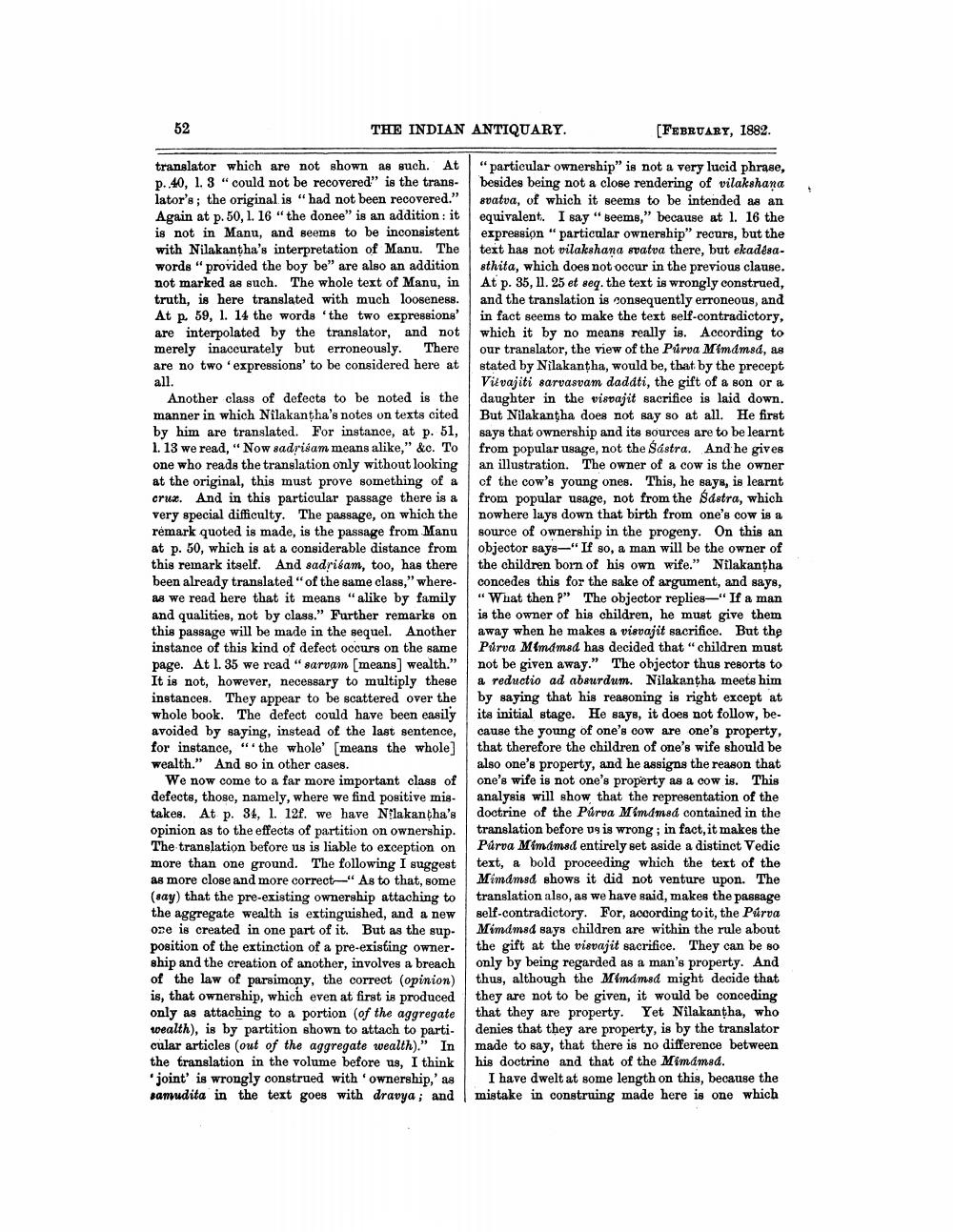________________
52
THE INDIAN ANTIQUARY.
[FEBRUARY, 1882
translator which are not shown as such. At p..40, 1.3 "could not be recovered" is the translator's; the original is "had not been recovered." Again at p. 50, 1.16 "the donee" is an addition: it is not in Manu, and seems to be inconsistent with Nilakantha's interpretation of Manu. The words "provided the boy be" are also an addition not marked as such. The whole text of Manu, in truth, is here translated with much looseness. At p. 59, l. 14 the words 'the two expressions' are interpolated by the translator, and not merely inaccurately but erroneously. There are no two expressions' to be considered here at all.
Another class of defects to be noted is the manner in which Nilakantha's notes on texts cited by him are translated. For instance, at p. 51, 1.13 we read, "Now sadrisam means alike," &c. To one who reads the translation only without looking at the original, this must prove something of a cru. And in this particular passage there is a very special difficulty. The passage, on which the remark quoted is made, is the passage from Manu at p. 50, which is at a considerable distance from this remark itself. And sadrićam, too, has there been already translated" of the same class," where. as we read here that it means "alike by family and qualities, not by class." Further remarks on this passage will be made in the sequel. Another instance of this kind of defect occurs on the same page. At 1.35 we read "saruam (means] wealth." It is not, however, necessary to multiply these instances. They appear to be scattered over the whole book. The defect could have been easily avoided by saying, instead of the last sentence, for instance, “the whole' (means the whole] wealth." And so in other cases.
We now come to a far more important class of defects, those, namely, where we find positive mis. takes. At p. 84, l. 12f. we have Nilakantha's opinion as to the effects of partition on ownership. The translation before us is liable to exception on more than one ground. The following I suggest as more close and more correct—"As to that, some (say) that the pre-existing ownership attaching to the aggregate wealth is extinguished, and a new one is created in one part of it. But as the supposition of the extinction of a pre-existing owner. ship and the creation of another, involves a breach of the law of parsimony, the correct (opinion) is, that ownership, which even at first is produced only as attaching to a portion (of the aggregate wealth), is by partition shown to attach to parti- cular articles (out of the aggregate wealth)." In the translation in the volume before us, I think
joint' is wrongly construed with ownership,' as samudita in the text goes with dravya ; and
"particular ownership" is not a very lucid phrase, besides being not a close rendering of vilakshana svatva, of which it seems to be intended as an equivalent. I say " Beems," because at l. 16 the expression particular ownership" recurs, but the text has not vilakshana svatva there, but ekadesasthita, which does not occur in the previous clause. At p. 35, 11. 25 et seq. the text is wrongly construed, and the translation is consequently erroneous, and in fact seems to make the text self-contradictory, which it by no means really is. According to our translator, the view of the Púrva Mmdmsd, as stated by Nilakantha, would be, that by the precept Vitvajiti sarvasvam daddti, the gift of a son or a daughter in the visvajit sacrifice is laid down. But Nilakantha does not say so at all. He first says that ownership and its sources are to be learnt from popular usage, not the Sastra. And he gives an illustration. The owner of a cow is the owner of the cow's young ones. This, he says, is learnt from popular usage, not from the Sastra, which nowhere lays down that birth from one's cow is a source of ownership in the progeny. On this an objector says-"If so, a man will be the owner of the children born of his own wife.” Nilakantha concedes this for the sake of argument, and says, "What then P" The objector replies—"If a man is the owner of his children, he must give them away when he makes a visvajit sacrifice. But the Purva Mindmed has decided that "children must not be given away." The objector thus resorts to a reductio ad absurdum. Nilakantha meets him by saying that his reasoning is right except at its initial stage. He says, it does not follow, because the young of one's cow are one's property, that therefore the children of one's wife should be also one's property, and he assigns the reason that one's wife is not one's property as a cow is. This analysis will show that the representation of the doctrine of the Púrva Mindmed contained in the translation before us is wrong; in fact, it makes the Párva Mimamsi entirely set aside a distinct Vedic text, a bold proceeding which the text of the Mimdmsd shows it did not venture upon. The translation also, as we have said, makes the passage self-contradictory. For, according to it, the Púrva Mindmed says children are within the rule about the gift at the visvajit sacrifice. They can be so only by being regarded as a man's property. And thus, although the Mindmed might decide that they are not to be given, it would be conceding that they are property. Yet Nilakantha, who denies that they are property, is by the translator made to say, that there is no difference between his doctrine and that of the Mimámad.
I have dwelt at some length on this, because the mistake in construing made here is one which




